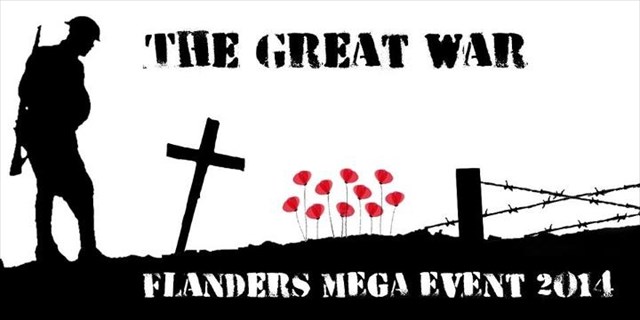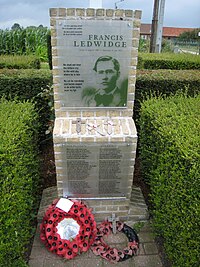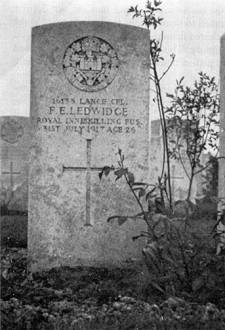TGW14:#44 Francis Ledwidge Traditional Cache
TGW14:#44 Francis Ledwidge
-
Difficulty:
-

-
Terrain:
-

Size:  (regular)
(regular)
Please note Use of geocaching.com services is subject to the terms and conditions
in our disclaimer.

Nederlandstalige beschrijving:
Ledwidge werd geboren in Janeville, Slane, in Ierland, en was de achtste van negen kinderen in een arme familie. Zijn ouders, Patrick Ledwidge (de familie Ledwidge van Shropshire, werd land verleend in Meath na de invasie van de Normandiers) en vrouw Anne Lynch (1853–1926), geloofde om het beste onderwijs dat ze konden veroorloven te geven aan hun kinderen. Maar toen Francis slechts vijf jaar oud was stierf zijn vader vroegtijdig, en werd zijn vrouw en de kinderen op een jonge leeftijd gedwongen uit te werken. Francis verliet de lokale nationale school op dertienjarige leeftijd, en terwijl hij aan zelfstudie deed, werkte hij bij wat bij op een boerderij, vatenmaker en toezichthouder op de wegen. als koper mijnwerker werd hij ontslagen voor het organiseren van een staking voor beter mijnbouw voorwaarden, drie jaar voorafgaand aan de algemene staking van 1913. hij was een vakbond activist sinds 1906 en shop assistent. Benoemd tot secretaris van de Slane tak van de Meath vakbond (1913-1914) had hij aspiraties van permanente witte-boorden werk. Hij stond bekend om zijn connecties met Sinn Féin.

Ledwidge was een overtuigde patriot en nationalist. Zijn inspanningen om een tak van de Gaelic League op te richten in Slane werden gedwarsboomd door leden van de lokale Raad. De district organisator moedigde hem aan zijn strijd voortzetten, maar Francis stopte er mee. Hij slaagde er wel in om samen met zijn broer Joseph van de Slane tak van de Ierse vrijwilligers (1914) op te richten, een nationalistische kracht gecreëerd in reactie op de bewapening van de Ulster vrijwilligers die zwoer zich te verzetten tegen de invoering van de Home Rule voor Ierland, met geweld als moet De Ierse vrijwilligers werden opgericht om hun agressie te voorkomen en om ervoor te zorgen dat democratie zou zegevieren.
Bij het uitbreken van eerste Wereldoorlog in augustus 1914, en wegens Ierlands betrokkenheid in de oorlog, werden de Ierse vrijwilligers opgesplitst in twee fracties, de nationale vrijwilligers die John Redmond’s oproep volgde om in de Ierse regimenten te gaan en zo de geallieerde kant te steunen en degenen die dat niet deden. Francis was oorspronkelijk van de laatstgenoemde partij. Niettemin, na dit standpunt op een lokale zitting van de Raad sterk te hebben verdedigd, ging hij op 24 oktober 1914 in Lord Dunsany’s regiment, het 5e Bataljon Royal Fusiliers Inniskilling, onderdeel van de 10th (Irish) Division. Dit was tegen de wil van Dunsany die tegen zijn aanmelding was en bood hem een toelage ter ondersteuning aan als hij weg bleef van de oorlog. Sommigen hebben gespeculeerd dat hij ten strijde trok omdat zijn liefje Ellie Vaughey een nieuwe minnaar had gevonden, John O'Neill, waarmee ze later trouwde, maar Ledwidge zelf schreef, en krachtig, dat hij niet opzij kon kijken terwijl anderen Ierlands vrijheid te verdedigen. Ledwidge lijkt het leven in het leger goed te verteren en kreeg snel promotie tot lance corporal. In 1915 zag hij actie bij Sulva baai in de Dardanellen, waar hij aan ernstige reuma leed. Na de enorme verliezen door zijn eenheid te hebben overleeft in de slag bij Gallipoli, werd hij ziek na een rugblessure door een zware bergtocht in Servië (December 1915), een plaats die hem tot een aantal gedichten geïnspireerd.
Ledwidge was geschokt door het nieuws van de Easter Rising (Easter Rebellion), en werd in de krijgsraad veroordeeld omdat hij zijn verlofperiode overschreed en dronken in uniform was en werd gedegradeerd (mei 1916). Hij herkreeg en verloren opnieuw zijn strepen in een periode in Derry (hij was een korporaal toen de introductie tot zijn eerste boek werd geschreven), en vervolgens, keerde hij terug naar het front en ontving opnieuw zijn lance corporal streep in januari 1917 toen hij naar het Westelijke Front werd gezonden, toegewezen tot 1ste Bataljon, Royal Fusiliers Inniskilling, onderdeel van het 29ste divisie.
Ledwidge bleef schrijven wanneer mogelijk, gedurende de oorlogsjaren. Hoewel hij veel werk verloor in het afschuwelijke weer in Servië stuurde hij een groot deel van zijn oeuvre aan Lord Dunsany, familie, vrienden en literaire contacten. Op 31 juli 1917 was de groep van Ledwidge een weg aan het aanleggen ter voorbereiding van een aanval tijdens de derde slag om Ieper, in de buurt van het dorp van Boezinge, ten noordwesten van Ieper (Ypres). Terwijl Ledwidge thee aan het drinken was met zijn kameraden aan de rand van de weg, ontplofte een granaat naast hen en dode de dichter en vijf anderen. Een aalmoezenier die hem goed kende, arriveerde kort na de beschieting en noteerde "Ledwidge gedood, in stukken geblazen."
De gedichten die Ledwidge schreef in actieve dienst toonde zijn trots als een soldaat, omdat hij in dienst van Ierland geloofde. Hij vroeg zich af of hij een soldatenkoor zou krijgen. De doden werden begraven op Carrefour de Rose, en later opnieuw begraven in de nabijgelegen militaire begraafplaats artillerie Wood te Boezinge, (waar ook de Welse dichter Hedd Wyn, gedood op dezelfde dag, ook is begraven). Een stenen tablet herdenkt hem in het eiland van Ierland vrede Park, Mesen, België. Zijn werken als "boer dichter" en "soldaat dichter", werden een standaard onderdeel van de Ierse schoolprogramma's voor vele decennia van de 20e eeuw. De intensiteit, in combinatie met een nieuw ingeblazen belang in zijn periode, werd door zijn werk vereeuwigd.
English description:
Ledwidge was born at Janeville, Slane, in Ireland, the eighth of nine children in a poverty-stricken family. His parents, Patrick Ledwidge (the Ledwidge family, from Shropshire, was granted land in Meath after the Norman invasion) and wife Anne Lynch (1853–1926), believed in giving their children the best education they could afford. But when Francis was only five his father Patrick died prematurely, which forced his wife and the children out to work at an early age. Francis left the local national school aged thirteen, and while he continued to educate himself, he worked at what work he could find, as farm hand, road mender and supervisor of roads, as copper miner (sacked for organising a strike for better mining conditions, three years before the general 1913 strike, he was a trade union activist since 1906) and shop assistant. Appointed secretary of the Slane branch of the Meath Labour Union (1913–14) he had aspirations of permanent white-collar work. He was known for his connections with Sinn Féin.
Ledwidge was a keen patriot and nationalist. His efforts to found a branch of the Gaelic League in Slane were thwarted by members of the local council. The area organiser encouraged him to continue his struggle, but Francis gave up. He did manage to act as a founding member with his brother Joseph of the Slane Branch of the Irish Volunteers (1914), a nationalist force created in response to the arming of the Ulster Volunteers who swore to resist the introduction of Home Rule for Ireland by force, if need be. The Irish Volunteers were set up to prevent their belligerence and to ensure democracy would prevail. On the outbreak of World War I in August 1914, and on account of Ireland's involvement in the war, the Irish Volunteers split into two factions, the National Volunteers who supported John Redmond's appeal to join Irish regiments in support of the Allied war cause and those who did not. Francis was originally of the latter party. Nevertheless, having defended this position strongly at a local council meeting, he enlisted (24 October 1914) in Lord Dunsany's regiment, joining 5th battalion Royal Inniskilling Fusiliers, part of the 10th (Irish) Division. This was against the urgings of Dunsany who opposed his enlistment and had offered him a stipend to support him if he stayed away from the war. Some have speculated that he went to war because his sweetheart Ellie Vaughey had found a new lover, John O'Neill, whom she later married, but Ledwidge himself wrote, and forcefully, that he could not stand aside while others sought to defend Ireland's freedom.
Ledwidge seems to have fitted into Army life well, and rapidly achieved promotion to lance corporal. In 1915, he saw action at Suvla Bay in the Dardanelles, where he suffered severe rheumatism. Having survived huge losses sustained by his company in the Battle of Gallipoli, he became ill after a back injury on a tough mountain journey in Serbia (December 1915), a locale which inspired a number of poems.

Ledwidge was dismayed by the news of the Easter Rising, and was court-martialled and demoted for overstaying his home leave and being drunk in uniform (May 1916). He gained and lost stripes over a period in Derry (he was a corporal when the introduction to his first book was written), and then, returned to the front, received back his lance corporal's stripe one last time in January 1917 when posted to the Western Front, joining 1st Battalion, Royal Inniskilling Fusiliers, part of 29th Division.
Memorial to Francis Ledwidge on the spot where he died Ledwidge continued to write when feasible throughout the war years, though he lost much work, for example, in atrocious weather in Serbia. He sent much of his output to Lord Dunsany, himself moving on war assignments, as well as to readers among family, friends and literary contacts.

On 31 July 1917, a group from Ledwidge's battalion of the Royal Inniskilling Fusiliers were road-laying in preparation for an assault during the Third Battle of Ypres, near the village of Boezinge, northwest of Ieper (Ypres). While Ledwidge was drinking tea in a mud hole with his comrades, a shell exploded alongside, killing the poet and five others. A chaplain who knew him, Father Devas, arrived soon after, and recorded "Ledwidge killed, blown to bits."
The poems Ledwidge wrote on active service revealed his pride at being a soldier, as he believed, in the service of Ireland. He wondered whether he would find a soldier's death. The dead were buried at Carrefour de Rose, and later re-interred in the nearby Artillery Wood Military Cemetery, Boezinge, (where the Welsh poet Hedd Wyn, killed on the same day, is also buried). A stone tablet commemorates him in the Island of Ireland Peace Park, Messines, Belgium. His work as "peasant poet" and "soldier poet", once a standard part of the Irish school curriculum, faded from view for many decades of the 20th century. Its intensity, coupled with a revived interest in his period, has restored it to life.
Description Français :
Ledwidge est né à Janeville, Slane, en Irlande et a été le huitième des neuf enfants dans une famille pauvre. Ses parents, Patrick Ledwidge (la famille Ledwidge du Shropshire, obtint des terres dans le Meath après l'invasion de Norman) et son épouse Anne Lynch (1853 – 1926), croyaient en donnant à leurs enfants la meilleure éducation, qu'ils pouvaient se permettre. Mais lorsque son père, mort de Patrick Francis seulement cinq au début, qui contraint son épouse et les enfants à travailler à un âge précoce. Francis quitte le local l'âge scolaire national treize, et tandis qu'il continuait à s'instruire, il travailla à quel travail il, comme une main ferme away barils et superviseur sur les routes, comme mineur cuivre pourrait trouver (licenciés pour avoir organisé une grève pour de meilleures conditions d'exploitation minière, trois ans avant la grève générale de 1913, il fut un militant syndical depuis 1906) et vendeuse. Nommé Secrétaire de la branche de Slane du syndicat Meath (1913-1914) il avait des aspirations du travail permanent de cols blanc. Il était connu pour ses liens avec le Sinn Féin. Ledwidge était un patriote convaincu et un nationaliste. Ses efforts pour mettre en place une branche de la Ligue gaélique à Slane ont été contrariés par les membres du Conseil local. Le district organisateur encourage alors à poursuivre son combat, mais Francis s'y arrêta. Il a réussi à faire équipe avec son frère Joseph, de la branche de Slane des volontaires irlandais (1914), un groupe nationaliste créé en réponse à l'armement des volontaires de l'Ulster qui s'est engagé à s'opposer à l'introduction de la Home Rule pour l'Irlande, avec violence, comme les volontaires irlandais ont été mis à prévenir leur agression et à s'assurer que la démocratie l'emportera.

Lors du déclenchement de la guerre mondiale en août 1914, et en raison de la participation de l'Irlande dans la guerre, ont été les volontaires irlandais scindé en deux factions, le national bénévoles qui suivi appel John Redmond dans les régiments irlandais et donc à soutenir le camp allié et ceux qui n'ont pas. Francis était à l'origine de ce dernier. Néanmoins, cette position sur une réunion locale du Conseil à avoir défendu fortement, il a suivi 24 octobre 1914 à Lord Royal Inniskilling Fusiliers régiment, bataillon de la 5e Dunsany, partie de la 10e Division (irlandaise). C'était contre la volonté de Dunsany, qui s'oppose à sa demande et lui avait offert une subvention pour soutenir comme il restait loin de la guerre. Certains ont émis l'hypothèse qu'il a tiré parce que sa petite amie Ellie Vaughey pour combattre un nouvel amant, John O'Neill, avec lesquels elle épousa plus tard, mais Ledwidge lui-même a écrit et puissant, qu'il ne pouvait pas regarder côté tandis que d'autres pour défendre la liberté de l'Irlande. Ledwidge semble la vie armée que Digest correctement et rapidement obtenu promotion de lance corporal. Il combattit à Sulva Bay en 1915 dans les Dardanelles, où il a souffert de rhumatismes graves. Après les énormes pertes en ayant son unité survit à la bataille de Gallipoli, il était malade après une blessure au dos par une montagne lourde tournée en Serbie (décembre 1915), un endroit qui lui a inspiré de nombreux poèmes.
Ledwidge a été choqué par la nouvelle de l'insurrection de Pâques (Easter rébellion) et a été dans la Cour martiale condamne à qu'il a dépassé sa période de congé et ivre en uniforme a été et a été rétrogradé (mai 1916). Il a perdu une fois de plus et il a regagné ses galons dans une période à Derry (il était caporal lors de l'introduction à son premier livre a été écrit), et puis, il revient à l'avant et de nouveau reçu sa séquence de caporal en janvier 1917, quand il a été envoyé sur le Front occidental, attribuée à 1er Bataillon, Royal Inniskilling Fusiliers, partie de la 29e Division. Ledwidge a continué à écrire lorsque cela est possible pendant les années de guerre, bien qu'il a perdu beaucoup de travail, dans la terrible météo en Serbie a perdu. Il envoya une grande partie de son œuvre de Lord Dunsany, famille, amis et contacts littéraires. Le 31 juillet 1917 Ledwidge était le groupe d'une route à l'édifice en prévision d'une attaque au cours de la troisième bataille d'Ypres, près du village de Boezinge, nord-ouest de Ieper (Ypres). Ledwidge a boire du thé avec ses camarades sur le bord de la route, a explosé une grenade à côté d'eux et le poète et les cinq autres morts. Un aumônier qui le connaissaient bien, est arrivé peu après le bombardement et enregistré « Ledwidge tués, soufflé aux morceaux. »
Les poèmes Ledwidge a écrit en service actif a montré sa fierté comme un soldat, parce qu'il croyait au service de l'Irlande. Il se demande s'il pourrait obtenir un mourir de soldat. Les morts étaient enterrés au Carrefour de Rose et plus tard encore enfouies au voisin d'artillerie bois cimetière militaire, Boezinge (poète gallois Hedd Wyn, qui a aussi tué le même jour, est également enterré). Une tablette de Pierre lui commémore dans le parc de l'Ile de paix de l'Irlande, Messines, Belgique. Son travail comme un « poète des paysans » et « poète du soldat », les irlandais ont été un élément standard des programmes scolaires pendant de nombreuses décennies du XXe siècle. L'intensité, combinée avec un nouvel intérêt revigoré dans sa période, son travail s'est immortalisé.
Additional Hints
(No hints available.)